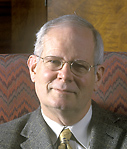Constantine Cavafy, the greatest Greek poet of the 20th century, was interested in understanding the past and making it relevant to his own life. Cavafy, who lived from 1863-1933, wrote poems that often dealt with the history of the Greek diaspora within the Eastern Mediterranean. Nearly one-sixth of his surviving poems concern the last two centuries BCE, when the Roman Republic came to dominate and eventually demolish the great Hellenistic kingdoms founded by Alexander the Great’s successors.
 “Cavafy, a government worker living in Alexandria, saw broad analogies between the demoralized Hellenistic world and his own experiences as a marginalized homosexual writer living in colonial Egypt,” says Bruce Frier, the 2008 John and Teresa D’Arms Distinguished University Professor of Classics and Roman Law and a professor of classical studies and of law. In his Distinguished University Professor lecture, Frier will examine how Cavafy used Hellenistic history to explore and explain his own status and write some of his greatest poetry. His talk “Making History Personal: Constantine Cavafy and the Rise of Rome” is 4 p.m. Feb. 25 in Rackham Amphitheatre.
“Cavafy, a government worker living in Alexandria, saw broad analogies between the demoralized Hellenistic world and his own experiences as a marginalized homosexual writer living in colonial Egypt,” says Bruce Frier, the 2008 John and Teresa D’Arms Distinguished University Professor of Classics and Roman Law and a professor of classical studies and of law. In his Distinguished University Professor lecture, Frier will examine how Cavafy used Hellenistic history to explore and explain his own status and write some of his greatest poetry. His talk “Making History Personal: Constantine Cavafy and the Rise of Rome” is 4 p.m. Feb. 25 in Rackham Amphitheatre.
Distinguished University Professor is the highest professorial title granted at U-M. A reception will follow the lecture, which is free and open to the public.
“Cavafy was a much loved poet because he was personal and accessible,” Frier says. “He was one of the first poets in the modern world to talk openly about homosexual themes and in his time it was very controversial to do this. He is a trailblazer.”
A famous poem by Cavafy, “The God Abandons Antony,” deals with the Roman general Mark Antony, who is facing defeat and his own suicide in 30 BCE, Frier says.
“Antony is coming to terms with the failure of his own great plans, but also learning to accept that failure, in part through his relationship with the city of Alexandria,” he says.
Some of the most famous lines in the poem, “Like one who’s long prepared, like someone brave, bid farewell to her, to Alexandria, who is leaving,” illustrate Antony’s journey to the acceptance of his fate, Frier says.
In addition to Frier’s Law School professorship, in 2001-02 he served as the interim chair for the Department of Classical Studies and holds a joint appointment in that department. He also is a member of both the American Philosophical Society and the American Academy of Arts and Sciences. Frier received a Bachelor of Arts from Trinity College and a doctorate in classics from Princeton University. He was a fellow of the American Academy in Rome and taught at Bryn Mawr College before joining the Department of Classical Studies at U-M in 1969. He has taught at the Law School since 1981.
Frier is the author of numerous books and articles on economic and social history, focusing especially on Roman law. His publications include “Landlords and Tenants in Imperial Rome,” “The Rise of the Roman Jurists,” “A Casebook on the Roman Law of Delict,” “A Casebook on Roman Family Law” and most recently, “The Modern Law of Contracts” with Law School faculty colleague J.J. White.
In 2007 he received the Harold R. Johnson Diversity Service Award, established in 1996 in honor of Johnson, dean emeritus of the School of Social Work. The award recognizes faculty members who have contributed to the development of a culturally and ethnically diverse campus community.
At the time he was praised for his insistence on departmental participation in Martin Luther King Jr. symposia and events, bringing African scholars to U-M, raising salaries for women faculty to correct pay disparities and chairing the Task Force on the Campus Climate for Transgender, Bisexual, Lesbian and Gay Faculty, Staff and Students.

